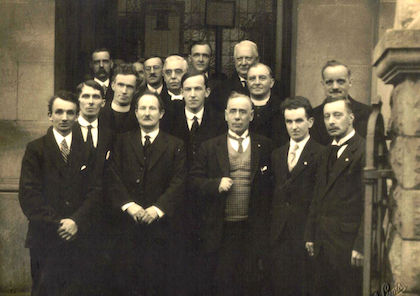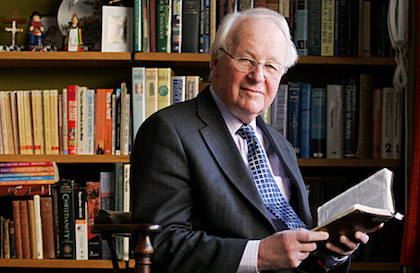We judge our experiences in the light of the Bible, not the other way around. That is the difference between evangelical faith and mysticism.
 Many have heard about evangelical Christianity because of well-known preachers such as Billy Graham.
Many have heard about evangelical Christianity because of well-known preachers such as Billy Graham.
The Oscar-nominated feature film “Jesus Camp” (2006) claimed to show the world of evangelical Christians in the United States with the full objectivity of the documentary genre. Heidi Ewig and Rachel Grady looked into the beliefs that the evangelical movement preaches to its 30 million members. But what are these beliefs?
In the film we meet Levi, a forthright preacher aged 12, who at home is taught about creationism and the absence of global warming, apparently two characteristics of the evangelical movement. We also encounter a nine-year old girl who feels called to evangelize a young girl in a bowling alley and some men resting on a park bench. Another ten year old boy tells us that he is a fan of Christian heavy metal.
They all attend camps organized by the pastor of an evangelical church in North Dakota. There they learn that Harry Potter embodies all kinds of satanic messages and that if the author, J. K. Rowling, had appeared in the Bible, she would have been condemned to death. They pray for the President of the United States, using a life-size image of him; roll around on the floor talking in tongues, and learn the story of Adam and Eve using Barbie and Ken dolls.
 The documentary Jesus Camp was nominated to the Oscar.
The documentary Jesus Camp was nominated to the Oscar. The same documentary also features Ted Haggard, the former President of the National Association of Evangelicals, and we learn that he resigned following revelations of his relationship with a person working as a male prostitute, having previously been a staunch opponent of gay marriage. The press tells us that, following the right therapy, he has apparently become heterosexual again.
Listening to these things makes us feel some sympathy for all those who are still pretty disconcerted when they are asked what an evangelical is. In certain Roman Catholic countries in Europe, such as Spain, there is a lot of religious ignorance about everything that is not Catholicism and the press seems to be increasingly misinformed. But neither can it be said that they are making things up. We should recognize that it isn’t easy to know what an evangelical is.
WHAT IS THE GOSPEL?
The word “evangelical” comes from the Greek word evangelion, meaning “good news”. We could consider the meaning of the word in various different countries, its theological nuances and other interesting details, but you will humour my simple-mindedness if I go straight to what the Bible says in order to understand what the “evangelion” or good news is about, and to better understand what an evangelical is.
In 1 Corinthians 2:1–5 we are presented with the basis of the gospel. The word of God is not a human invention or the result of speculation, but God’s revelation. To many this may sound like fundamentalism – that terrible word and the worst insult that can be hurled at a Christian. However, if being fundamentalist means believing that the gospel comes from God, then we must be fundamentalist.
The gospel does not depend on the latest theological trend, and it isn’t the result of a tradition that the church has maintained over the centuries on the basis of the experiences of those first disciples. It is God’s gospel because God himself revealed it in his eternal Word.
We cannot substitute God’s voice for that of men. Revelation is not the product of human genius or physical effort, but the result of the free and sovereign initiative of God, who decided to reveal himself to humankind. In order to communicate with us He has adopted human language. He has chosen people through whom to express himself and these human words are the words of God; the result of divine inspiration.
Our understanding of the Gospel isn’t derived from the “wisdom of words” (1 Cor. 1:17), or the “wisdom of the world” (v. 20), but from the “wisdom of God” (1:24; 2:7), which is true wisdom.
“There is a philosophy that denies the infinite”, says Victor Hugo. “There is also a philosophy, classified as pathologic, that denies the sun; this philosophy is called blindness”. People don’t deny God’s revelation because they see things clearly. Man has not stopped believing in God having reached a certain level of intelligence or a deeper knowledge of science and life, making it difficult to believe in Him. It is the fool who says in his heart: “There is no God” (Psalm 14). Atheism isn’t a sign of intelligence, but of foolishness.
What is it all about then? In the eyes of the world it isn’t wisdom, but madness; it doesn’t signal power but weakness; nevertheless, the wisdom and the power of God lie in “Jesus Christ and him crucified” (1 Cor. 2:2). That is why Paul decides to proclaim only Christ and his cross. The inhabitants of Corinth were idolatrous and materialistic, but Paul isn’t bringing them a new spirituality. They were living a proud and immoral life, but Paul does not launch a campaign to promote good behaviour and Christian morality – he preaches a gospel centred on Christ.
 Lloyd-Jones and others in the chapel where he preached, in the 1920s.
Lloyd-Jones and others in the chapel where he preached, in the 1920s.The evangelical movement isn’t the result of moralistic campaigns seeking to promote decency and good works. This is what many churches have done in the past, but these churches were not necessarily those best known for their evangelical faith, but rather for their humanism and social work. All reforms and periods of revival have been born out of the gospel. This is the reason why a preacher like Lloyd-Jones refused to leave his church in the 1920s, to continue bringing the gospel to the alcoholics. We have so much to learn from those who have gone before us when, for example, we become embroiled in anti-gay campaigns. How do we expect homosexual people to hear the gospel when we spend our time fighting against their rights? Homosexuality may be a sin, but the sinner needs to hear the gospel, rather than moral advice. The good news of the gospel is that “Christ died for our sins…that he was buried, that he was raised on the third day” (1 Cor. 15:3–4). We preach Christ.
The gospel is Christ-centred, but it is also biblical. Once and again we are told that the Christ that Paul preaches to the Corinthians is “according to the Scriptures” (vv. 3–4). The basis of evangelical faith is not actually an experience, but a book. If there is a truth, beyond any feeling, it can be found in God’s revelation in the Scriptures. We judge our experiences in the light of the Bible, not the other way around. That is the difference between evangelical faith and mysticism. If we believe that God is real, it is not primarily because we feel it is so, but because that is what He has revealed about Himself in His word.
We cannot therefore reduce faith to an experience. Faith is not tantamount to being happy. Many people find bliss in ignorance and incredulity. We sometimes have a strange idea of the world around us. Surveys tell us that people are in fact generally happy with the lives they lead. The same happens with religion. Many people are happy to be in cults. They may be confused and exploited but they are happy as they are.
Faith is not simply a matter of sincerity. Many people say that it doesn’t matter what you believe, provided that you are sincere. They have turned sincerity into a synonym of truth, but it is possible to be sincerely mistaken. We all have good intentions, but countless atrocities have been committed throughout history on the basis of good intentions. Do we somehow believe that suicide bombers are insincere? What matters is the truth. But where can we find the truth? If that truth is in a book, the Bible becomes a paper Pope. What does it mean to say that we believe in the sole and infallible scriptures? It means that the Bible is our ultimate rule of faith and conduct.
Some will say that all Christians believe in the Bible, but that it depends on how it is interpreted. For Roman Catholics, the authority of the Bible depends on the interpretation of Church teaching. Rahner, a famous theologian with great influence in Vatican II, was once asked about the posture of Hans Küng, who denied the Pope’s infallibility. He answered: “So if Küng says that the Pope is not infallible, and the Bible is not infallible either, then Hans Küng must be the infallible one”. It is as simple as that. It is a question of authority. If we don’t trust the Bible, it means that we trust ourselves. That is why evangelical faith, far from being a manifestation of arrogance, recognizes that we do not have the truth; only God has it. It is because we trust Him that we say that His is the truth and ours is the error.
Others will say that the problem is not the authority of the Bible, but its interpretation. Modern day hermeneutics give the impression that one can understand more or less anything from a text. It is such a subjective vision that we lose sight not only of the author but of the meaning of the Word itself. In Wonderland, Alice meets Humpty Dumpty – some sort of anthropomorphic egg – who likes to use words whimsically. He tells her, “When I use a word… it means just what I choose it to mean – neither more nor less”. To this Alice objects, “the question is… whether you can make words mean so many different things”. But for Humpty, “the question is… which is to be master – that’s all”. It is ultimately a question of authority. If we don’t submit to the authority of the Bible, we submit to another authority.
The gospel is not only Christ-centred and biblical, it is also historical. This can be seen in the reference made to Christ’s burial (1 Cor. 15:4), which is even mentioned in the Christian creed. Jesus didn’t carry on living after the crucifixion or die somewhere in Kashmir. He did not faint away only to be revived in some Dead Sea cave. No one died in his stead, as claimed in the Koran and some apocryphal gospels. Jesus truly died and rose again (v. 4). The good news is based on the historical facts about Jesus of Nazareth. There is no differentiation between the Jesus of faith and the Jesus of history, as some branches of modern theology claim.
If someone were therefore to find – like Antonio Banderas does in the film The Body – Jesus’ remains in some place in Jerusalem, it wouldn’t just be the Vatican who would have a problem. It would be a problem for all Christians. As the apostle Paul says in 1 Corinthians 15, if Jesus did not rise again, our faith is meaningless and we are truly worthy of pity. That is the extent to which our faith depends of the reality of what happened on that day in time and space. Our hope is therefore not so much in the message but in the reality of the resurrection. If He lives, then we live too.
 John Stott sais the gospel should lead Christians to true humility.
John Stott sais the gospel should lead Christians to true humility.Believing in the gospel is not, however, merely believing in historical facts. The Gospel is centred on Christ, it is biblical and historical, but it is also theological. Theology isn’t a hobby for those who have nothing better to do. Our salvation depends on theology, since “Christ died for our sins” (1 Cor. 15:3). His cross is not only a historic event, but it has a theological or redemptory meaning. Sin and death are related in Scripture. But if one is a consequence of the other, why did Jesus die if he hadn’t sinned? “He died for our sins”. The sins are ours, the death is His. He took our punishment. It is the only way that we can be “saved” (15:2).
Jesus didn’t come to make up for our faults but to take on the full weight of our sin. His death is the death of death. “Everything would change if we were one day to discover that we could overcome death”, says the specialist in developmental genetics Ginés Morata. “What are religions but a subterfuge invented to escape from death?”. Where then does his hope lie? It lies in research which has been able to extend the life of worms by six to eight times their normal length. That is why he believes that death is not “biologically unavoidable”. One would need to have a lot of faith to believe that!
Death is a constant reminder of our sin. The Spanish film director Almodóvar once said, “I have a serious problem with death, I do not accept it or understand it”. Death is a reality despite all our efforts to avoid it like children whistling their fear of the dark away. It is an inescapable appointment that we cannot just skip. It speaks to us of an evil from whose consequences we cannot retreat.
The resurrection of Christ is however the trumpet sound of Christ’s victory over death. We do not yet see all the things that remain unseen, but when He returns in glory, those of us who are bound to Him will see new life manifested (Colossians 3:4), with all His power and glory. On that day we will be like Him. Everything that we are now in part, we will then be in full, when He is all in all and His reign has no end.
This is the apostolic teaching, which gives us our security. Apostolic continuity does not lie in a sacramental ordination, transmitted from one person to the next through an episcopal blessing. The apostolic tradition is found in 1 Corinthians 15:11, the message which he (Paul) or they (the twelve), had preached and we (the Church) have believed. This chain entails a unity of faith between the apostles and the Church touching every generation.
The gospel is ultimately a personal reality. The death and resurrection of Christ is not only history and theology, but a change for a personal salvation. That is how the Corinthians received it, and they persevered in it being saved in order to keep their salvation (v. 2). This is our hope, a “living hope” (1 Peter 1:3), not a vague but a secure hope. It is anchored in the past through the death and resurrection of Jesus Christ, upholding the future as a present reality, that we hope one day to see fully realized. Our certainty of salvation is not however a gesture of arrogance, but our trust in the fact that, in the same way as He lives, we will also live.
This theology is too individualistic for some evangelicals. The new take on Paul’s teaching challenges us to see salvation less individually. Justification would entail, not so much a personal declaration of our acceptance by God, but the reconciliation of Jews and gentiles in one single nation. The legal language that has been used up until now to talk about justification seems more appropriate for the Reform of the sixteenth century than for Paul’s teachings, it is said. Again, the words seem to acquire another meaning. However, that is the wonder of the gospel: a personal salvation that we never have to give up, especially not for theological speculation that now tries to understand the gospel better than ever before.
We are never lacking in arrogance. Evangelicals have acquired the reputation for fanaticism due to the superciliousness with which we can sometimes talk. The evangelical faith, as John Stott argues, should lead us to true humility. If what we seek is God’s glory, we should not be trying to big ourselves up. His word is truth, His is the infallible authority, but we can make mistakes.
THE EFFECTIVENESS OF THE GOSPEL
The apostolic ministry has always been accompanied by an awareness of “weakness”. “Much fear and trembling” (1 Cor. 2:3) is felt in preaching, alongside “a demonstration of the Spirit’s power” (v.5). The effectiveness of the gospel is not dependant on our rhetoric of “human wisdom”, but on the power of the Holy Spirit. The gospel comes from God, is centred on Christ and his cross, but it is confirmed by the Holy Spirit.
 Many now ask themselves if being an evangelical means to be a Donald Trump supporter.
Many now ask themselves if being an evangelical means to be a Donald Trump supporter.We have to recognize that as evangelicals we have placed too much trust in our strategies, methods and statistics. The strength of the gospel does not lie in any human system to empower the gospel. On the contrary, our attempts to give it more strength make our message weaker. Only renewed trust in the power of the Holy Spirit can give us a hopeful outlook onto the future of the gospel in this continent. Nothing seems to announce the arrival of a great revival of the gospel. There is a certain amount of growth, but nothing spectacular. What then can we do?
We must continue preaching the gospel with fear and trembling, aware of our weakness but knowing that God rejoices in demonstrating his power in the midst of that weakness. We can expect nothing from those around us, but everything from God. There seems to be little interest. The ambient selfish materialism has entered the Church. People don’t show enough commitment and appear indifferent. The good news is that God’s gospel, with Christ crucified at its heart, manifests its power through the work of the Holy Spirit. For that reason, together with the Early Church, we can pray for the Holy Spirit to come and renew the work of God in this world, producing a new creation to His glory. The Church therefore needs to be charismatic, if it really wants to be a Church, because it depends on God’s Spirit.
We are Christians, confessing a universal faith, therefore, catholic although not Roman. Our faith is apostolic because it is based on the teaching of the apostles, which is the basis of the Church. Christian, catholic, apostolic and – why not?– charismatic, as we depend on the work of the Holy Spirit. This is the Trinitarian faith. As evangelicals, we emphasize the Word, the Cross and the Holy Spirit. Our faith is therefore one of worship to the glory of the Father, the Son and the Holy Spirit; to Him who was from the beginning and forever shall be. To Him be the glory. Amen.

Las opiniones vertidas por nuestros colaboradores se realizan a nivel personal, pudiendo coincidir o no con la postura de la dirección de Protestante Digital.
Si quieres comentar o